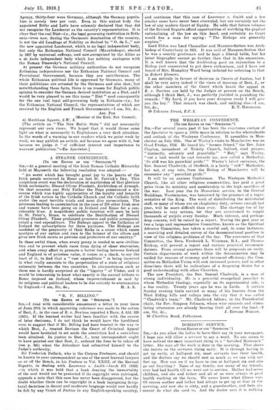THE WESLEYAN CONFERENCE. ITo THE EDITOR OF THE " SPECTATOR."]
SIR,—For several years past it has been the courteous custom of the Spectator to spare a little space in relation to the whereabouts and outlook of the Wesleyan Conference. It assembles in Man- chester on July 16th. One of Wesley's visits to Manchester was on Good Friday, 1752. He heard his " former friend," the Rev. John Clayton, incumbent of Trinity Church, Salford, read prayers "distinctly, solemnly and gracefully." "But," says Wesley, " not a look would he cast towards me, now called a Methodist, 'So stiff was his parochial pride.' " 'Wesley's latest successor, the Rev. Samuel Chadwick, of Sheffield, is a fairly " stiff " Methodist, but not, at any rate, from the Bishop of Manchester will he encounter any " parochial pride."
It will be an anxious Conference. The Wesleyan Methodist Church, like all other religious commun4ies, has paid a great price from its ministry and membership to -the high sacrifices of the war. Last year the In Memoriam service, in the Central Buildings, Westminster, was honoured by -the presence of a repre- sentative of the King. The work of distributing the ministerial staff, so many of whom are on chaplaincy duty, serious enough last year, will be more difficult than ever. The shortage too of lay preachers is very serious, for they are accustomed to supply thousands of pulpits every Sunday. Much interest, and perhaps deep concern, will be raised by a report. During the past year or two a large and representative Committee, known as the Spiritual Advance Committee, has taken a careful and, in .some instances, a searching and detailed survey of the denominational position in view of the religious problems of the day. The conveners of that Committee, the Rave. Frederick L. Wiseman, B.A., and Thomas Kirkup, will present a report and various practical recommen- dations. From several quarters there will be proposals on unity. Certain departments of work within the denomination may be unified for reasons of economy and increased efficiency; the Com- mittee on Methodist Union will seek increased powers, and in other directions there will be indications of a deepening desire for a good understanding with other Churches.
The new President, the Rev. Samuel Chadwick, is a man of strong individuality. He is a powerful evangelical preacher to whom Methodist theology, especially on its experimental side, is a fine reality. Twenty years ago he was in Leeds. A certain Sunday evening train carried so many of his hearers from the West Riding hills and valleys into the city that it was called " Chadwick's train." Mr. Chadwick follows, in the Presidential chair, the Rev. Simpson Johnson, whose wise counsels and stimu- lating utterances are already bearing fruit all over the land.—I am, Sir, &c., J. EDWARD HARLOW. 90 Cheriton Road, Folkestone.


























 Previous page
Previous page